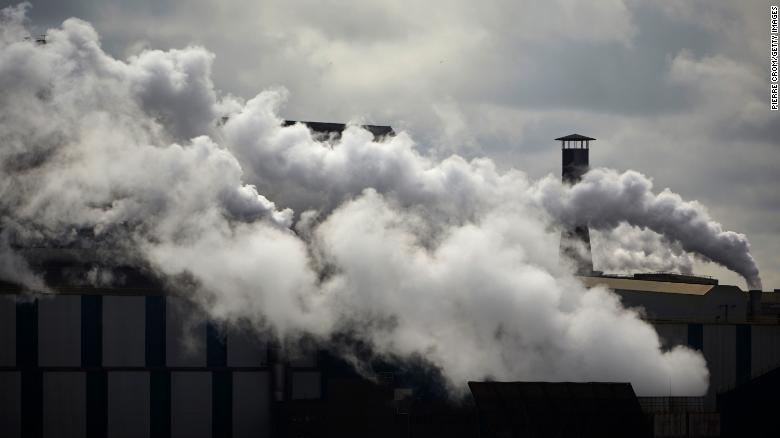Historic declaration agreed at COP26 0:45
(CNN) -
Nearly 200 countries adopted the Glasgow Climate Pact in talks known as COP26 on Saturday, after nearly two weeks of discussions of all kinds, from how much to limit global warming, what to say about fossil fuels, and even whether the countries most affected by the climate crisis must be compensated.
Some qualify it as success, others as failure, and many say it is something in between.
This is it had so you can decide for yourself.
The first mention of fossil fuels ... with many caveats
The agreement at COP26 makes an unprecedented mention of the role of fossil fuels in the climate crisis.
That is something that even the historic Paris Agreement could not achieve.
The Glasgow Climate Pact calls for subsidies on coal and inefficient fossil fuels to be phased out.
The language was originally stronger, but it was diluted several times.
It seemed that it might even have been scrapped near the end when India, supported by Iran, made it clear that it would not give its go-ahead.
The pact requires that all 197 parties agree to the final text.
However, at the last minute, India said it would accept the text with a modification: that coal is phased out, not phased out, in what some observers see an escape clause that would allow coal to continue to be used.
advertising
The COP26 agreement recognizes coal as the culprit of the climate crisis, but only commits to its "gradual decrease"
COP26 President Alok Sharma was seen polling opinion in the plenary room to see if others supported the change to essentially save the article.
When asked for her opinion on the deal as a whole, even Greenpeace International CEO Jennifer Morgan saw the inclusion of coal as a victory for the climate.
"It's tame, it's weak and the 1.5C target is barely alive, but a signal has been sent that the age of coal is ending. And that matters," he said.
Sharma was faced with questions about how he handled the last minute change, for which he later apologized.
"This will not bring us closer to 1.5, but will make it more difficult to achieve," said Swiss Environment Minister Simonetta Sommarug, receiving long applause.
But Indian Environment Minister Bhupender Yadav, who had objected to the mention, said it would be difficult for his country to end its use of coal and fossil fuel subsidies while trying to tackle poverty.
"How can developing countries be expected to make promises about eliminating subsidies on coal and fossil fuels?" He asked.
"The grants provide much-needed security and social support," he said, citing India's use of grants to supply LNG to low-income households.
2022: a year for the world to act together
Perhaps the most important change is the wording that asks parties to come to COP27 next year in Egypt with updated plans on how to reduce greenhouse gas emissions by 2030. Under the Paris Agreement, countries were only forced to update their 2025 targets.
The idea is for countries to increase their ambition more regularly, which should mean an acceleration towards net zero, a state in which the amount of greenhouse gases emitted is no greater than the amount removed from the atmosphere.
The latest scientific report on climate, released by the UN in August, called for emissions to be cut roughly in half by 2030 and for the world to reach net zero by mid-century to have any hope of keeping global warming at 1 , 5 degrees centigrade.
The question now is whether countries will actually do it.
"By agreeing to this emergency package, they have responded to increasing climate damage with an action plan to keep 1.5C within reach," said Nick Mabey, co-founder and CEO of the climate think tank E3G.
"But the real task begins now, as each country must go home and deliver on its Glasgow promises."
COP26 comes to a close after two weeks of key negotiations.
What was achieved?
Rich countries agreed more than 10 years ago to transfer $ 100 billion a year to developing nations to help them transform into low-carbon economies and adapt to the climate crisis. Adaptation can be anything from building sea walls to prevent flooding to moving communities away from the coast and retrofitting homes to better withstand extreme weather events.
Not only was the rich world unable to deliver the $ 100 billion before the 2020 deadline, but developing countries say it is not enough.
They had called for a 50% split between mitigation - measures to reduce emissions - and adaptation, which helps them cope with the consequences of climate change.
Much more money has been spent on measures focused on reducing emissions.
The Glasgow Climate Pact includes a doubling of adaptation funds by 2025, from 2019 levels, which represents progress in this area.
However, the US $ 100 billion target remains unfulfilled, and is likely to be achieved only in 2023, according to a report from the COP26 Presidency.
There are also questions about whether developed nations will maintain that level of funding annually.
"It is inexcusable that developed countries have failed to deliver on their commitment to provide $ 100 billion annually by 2020, despite contributing hundreds of billions of dollars in fossil fuel subsidies," said Ani Dasgupta, President and CEO of the World Resources Institute.
"It is significant that the final outcome of COP26 places an obligation on developed countries to report on their progress towards the US $ 100 billion target. Countries also made progress in developing a new financial target that goes beyond 2025. Nations also agreed to at least double adaptation funding by 2025, which implies at least $ 40 billion, which is very important progress. "
No "liability" fund to pay for the destruction caused by the climate crisis
Climate activists protest as they build a human corridor at the start of the Closing Plenary session, protesting "Out Polluters, In People" on November 11, 2021.
This is a point where many developing and climate-vulnerable countries will go home disappointed.
Hopes were high that a specific fund would be created to pay for the damage and destruction caused by the climate crisis in the worst affected countries.
The idea was that rich nations would pay for it, and if a country suffers an event like floods that destroy homes, this money could help them rebuild.
This is called "loss and damage" in climate parlance.
The agreement recognizes the importance of loss and damage and agrees to increase technical assistance to affected countries.
But instead of agreeing to a specific fund, he asks for more dialogue, which means that an actual fund can take years to arrive, if at all.
US climate envoy John Kerry confirmed after the decision that his country was against such a fund for now, while the European Union had previously said it would not support it.
Rachel Cleetus, director of policy and chief economist for the Climate and Energy Program at the Union of Concerned Scientists, said Australia was also blocking progress.
CNN contacted the delegation.
"The proposal for a Glasgow Loss and Damage Fund to channel new and additional funds for loss and damage did not materialize after being blocked by the richest nations, including the United States, Australia and the European Union," said Cleetus. .
"The final decision of COP26 is overwhelmingly compromised by the countries that have contributed the most to the climate crisis and, once again, denies justice to climate-vulnerable developing countries."
It took six years, but the Paris regulation is finally (almost) finished
If there's any sign of how slow progress can be by consensus, it wasn't until Saturday that the world agreed on the pending rules of the 2015 Paris Agreement. (Photo: Pierre Crom / Getty Images)
There was concern about the creation of carbon emission markets, known as "Article 6", which is so technical that the world could not agree on its wording and content for the last five years. There was concern about a loophole that could have allowed some countries to double-count their carbon credits. And that would be disastrous, as the world would soon lose track of how much greenhouse gases are actually removed or offset, and sold in markets.
One way to offset greenhouse gases is to pay countries with significant forest cover not to cut down their trees or to plant more.
Trees can absorb and retain large amounts of carbon.
Cutting or burning them releases carbon dioxide into the air.
One country could also pay another to build a wind farm, for example, instead of a coal or oil plant.
Brazil was pushing for this deal, as it could become a major exporter of carbon credits through the Amazon rainforest, but also through renewable energy projects, such as wind and solar.
It is good news that the rules have been definitively agreed and that some loopholes have been closed, but some experts warn of the danger of allowing too much compensation, saying that this is only an incentive for countries and companies to continue issuing as usual, especially rich countries and big companies that can afford a lot of compensation.
There are also concerns about the implications of the system for indigenous peoples, who fear the commodification of their lands.
According to the UN, indigenous peoples represent less than 5% of the world's population, but they protect 80% of the world's remaining forest biodiversity.
And although it was adopted, technically there are still some details that were not agreed.
Abdalah Mokssit: There are climatic events that have no turning back 8:53
"We are very pleased that the countries participating in COP26 have agreed on how global carbon trading will work to accelerate climate action. The progress made in Glasgow is a crucial step in keeping the global average temperature rise below 1, 5C, "said James Roth, Conservation International's senior vice president for global policy and government affairs.
"After six years of negotiations, the rules that allow countries to trade carbon credits with each other, known as Article 6.2, have been agreed with the exception of some operational elements," Roth said.
"This level of certainty will drive new investment to scale up desperately needed climate actions across all sectors, including halting deforestation and promoting other natural climate solutions."
And there you have it.
Some good news, some bad.
As UN Secretary General Antonio Guterres said, work begins now for COP27 in Egypt.
Only then will the real impact of Glasgow be seen.
COP26








